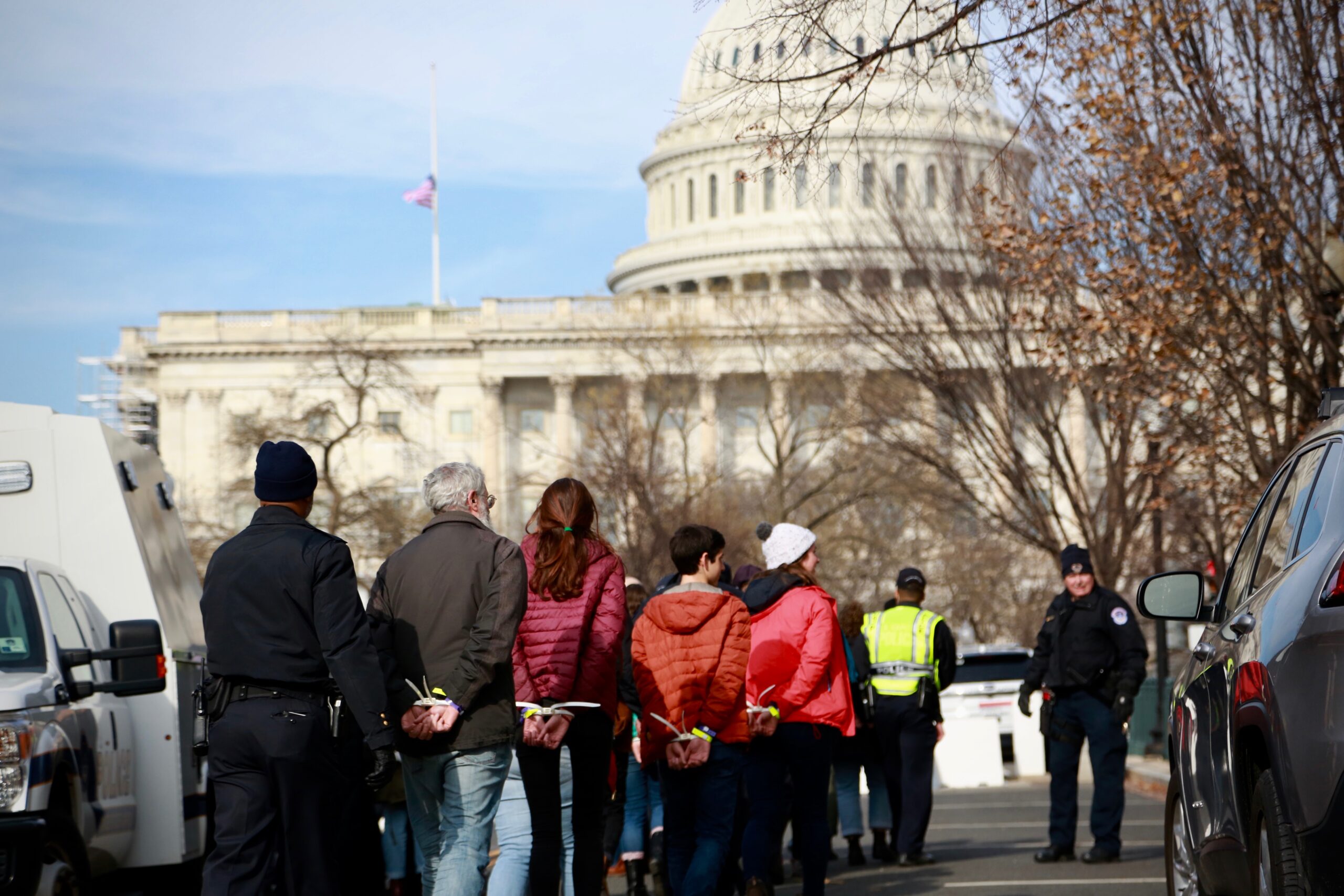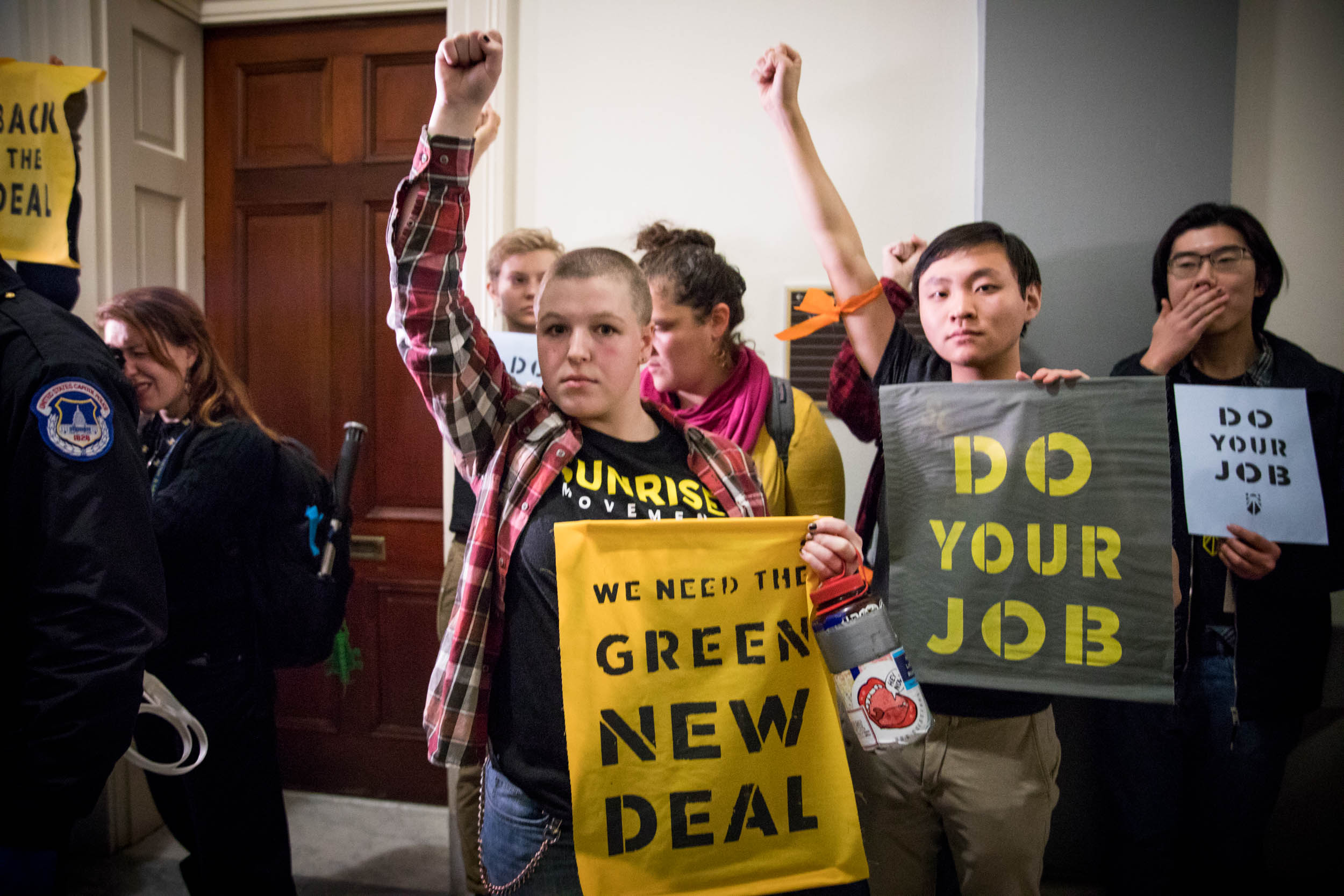Politics becomes personal as students advocate for climate change policy in D.C.
December 15, 2018
 Courtesy Corien Dijsselbloem
Courtesy Corien DijsselbloemPolitics doesn’t always happen during an optimal time—a lesson Bowdoin students learned last Sunday as they headed to Washington D.C., two days before finals period began. Sixteen students joined 1,000 protesters in the nation’s capitol this weekend to sit-in and encourage House Representatives to support a resolution for a Select Committee for a Green New Deal proposed by newly elected U.S. Representative, Alexandria Ocasio-Cortez (D-New York) and helped change several the minds of several congressmen while they were there.
The primary measure of Ocasio-Cortez’s proposal is to create a committee that would have legislative power to create policy that would address climate change. It followed and referenced the United Nation Climate Report that predicted that there are only 12 years to take action before irreversible change would be made.
Bowdoin students found the action encouraging after the stagnation in climate change policy from the Trump administration.
“Ocasio-Cortez’s resolution marks the first time that our government has proposed a solution to climate change that actually scales to the magnitude that science and justice demand. It sees the climate crisis for what it is—an issue that’s political, economic, social, and scientific, all at the same time- which all other proposed action in the past has failed to do,” said Haley Maurice ’20, one of the organizers of the trip.
The action was organized and partially-funded by the Sunrise Movement, a group of youth fighting to reduce fossil fuel use, called for protesters across the nation to participate in sit-ins at their representatives’ offices in hopes of garnering support for the proposal.
Within a week of hearing about the action, Maurice along with Maddie Hikida ’22 and Emilia Majersik ’22 organized the logistics such as transportation for 16 students from Bowdoin and three from Bates to head to D.C. Maurice worked as an organizational fellow for the Sunrise Movement last summer and was excited to connect Bowdoin with other young organizations that support climate justice.
 Courtesy Rachael Warriner
Courtesy Rachael WarrinerPrior to the action, 22 Representatives, including Chellie Pingree (D-Maine), had endorsed the resolution. On Monday, activists lobbied outside of Democratic Representatives’ offices who had not yet endorsed it. During the 24 hours of sit-ins and protests, nine representatives endorsed the proposal, bringing the number to 35 representatives in support.
During the sit-in, protesters were encouraged to share anecdotes with representatives and one another. Perrin Milliken ’22 described the personal stakes she had to her representative, Peter Welch (D-Vermont) in his office.
“I am a Nordic skier and I have skied my entire life. Each year I have to drive further to ski on snow, and each year I wonder if my children will have the opportunity to experience winter’s magic like I did,” Milliken said.
Soon after protesters left his office, Welch announced his support for the proposal by retweeting a post that Hikida had made hours earlier.
It was not the only success students had on Monday. During a sit-in at his office, Representative Jim McGovern (D-Massachusetts), the top Democrat on the House Rules Committee, addressed protesters and announced his commitment to the Green New Deal.
“We went there, we asked for something, and [McGovern] said yes. Even as young college students, we can actually make change,” Milliken said. “It makes you feel good, uniting for one cause that’s really powerful.”
Since Monday, potential Democratic nominee for the 2020 Presidential election, Cory Booker, has come out in support of the Green New Deal while other 2020 potentials have reached out to the Sunrise Movement to talk about going forward with climate change policy. Maurice said this support positions climate change to be a crucial factor in the 2020 election.
Students had the choice to risk arrest during the sit ins. Along with 135 other demonstrators, three Bowdoin students were peacefully arrested outside the office of Representative Steny Hoyer (D-Maryland).
This is not the first time this semester students have been arrested during political action. Eleven students were arrested in September during a protest in D.C. in the run-up to Brett Kavanaugh’s nomination to the Supreme Court.
While students saw the impact their actions had on representatives, they also gained insight on the daily challenges that members of Congress must address.
“I do feel that these people want to work with us and really want to see change. It’s hard to see change be made and it made me sympathize with them. They were explaining to us their challenges from their point of view,” said Majersik.
This semester, students have participated in more political activism both on-campus and off-campus. National organizations which focus on political activism are hoping to broaden Bowdoin’s involvement in politics by creating coalitions with the campus community.
“Though I’ve been organizing on campus, Bowdoin has felt disconnected from broader movements,” Maurice said.
She added that the group hopes to bring Sunrise to Maine next semester.
Of 14 Bowdoin students have been arrested this semester protesting against Kavanaugh or as part of the Sunrise Movement, nine have been first years. Maurice, who is in contact with leaders of student activist groups at Swarthmore and Brown, says they too have experienced a similar uptick in first-year activism.
“The age when we [first-years] were coming into knowledge about political stuff was right during a tumultuous political time of the 2016 election,” Majersik said. “It made politics a little more personal to us. Additionally, March for Our Lives was something a lot of participated in high school our senior year.”
As for their finals, the protesters didn’t seem to mind sacrificing studying for something they were passionate for.
“What you get on a test is important, but at the same time the grade you got on your math final is not going to be as important whether or not very final climate legislation gets passed, and if there is anything we can do to help that, I’d rather get a couple points off on a test,” Hikida said.

Comments
Before submitting a comment, please review our comment policy. Some key points from the policy: